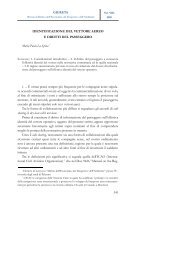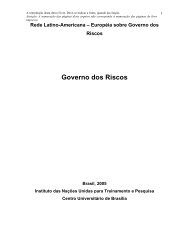Rome II and Tort Conflicts: A Missed Opportunity Abstract Contents
Rome II and Tort Conflicts: A Missed Opportunity Abstract Contents
Rome II and Tort Conflicts: A Missed Opportunity Abstract Contents
Create successful ePaper yourself
Turn your PDF publications into a flip-book with our unique Google optimized e-Paper software.
SYMEON C. SYMEONIDES ROME <strong>II</strong> AND TORT CONFLICTS<br />
applicable law to the extent it violates the forum’s m<strong>and</strong>atory rules (Article<br />
16) or its ordre public (Article 26);<br />
(2) provisions that require the court to choose a law that produces a particular<br />
result, such as Article 18, which authorizes a direct action against the insurer<br />
if such action is allowed by either the law applicable to the tort or the law<br />
applicable to the insurance contract; <strong>and</strong> Article 14(2) <strong>and</strong> (3) which provide<br />
that the contractually chosen law shall be disregarded to the extent it violates<br />
certain m<strong>and</strong>atory rules; <strong>and</strong><br />
(3) provisions that directly allow one litigant to choose between two laws,<br />
such as: Article 7, which allows the victim of an environmental tort to choose<br />
between the law of the place of conduct <strong>and</strong> the law of the place of injury; <strong>and</strong><br />
Article 6(3)(b), which allows the plaintiff to choose the law of the forum in<br />
certain cases involving anti-competitive restrictions.<br />
Although some of these content-oriented provisions have long been accepted<br />
by traditional PIL, the presence of the remaining ones suggests a selective receptiveness<br />
to the idea of content-oriented selection on the part of the drafters of <strong>Rome</strong> <strong>II</strong>.<br />
Moreover, as in other codifications, certain choice-of-law rules that purport to<br />
choose a state because of its contacts rather than its law, in fact are based on certain<br />
assumptions about the likely content of that law <strong>and</strong> to that extent they disguise<br />
specific substantive choices. One possible example from <strong>Rome</strong> <strong>II</strong> is Article 5 on<br />
products liability, which, as explained below, will lead to the application of the law<br />
50<br />
of the victim’s habitual residence in the great majority of cases. When the plaintiff<br />
is a resident of an EU country with a generous pro-consumer law <strong>and</strong> the manufacturer<br />
is based in a state with a pro-manufacturer law, Article 5 will ensure that the EU<br />
plaintiff will be protected under EU st<strong>and</strong>ards. However, in the converse situation, the<br />
same article will ensure that the EU defendant will be held accountable under the<br />
lower st<strong>and</strong>ards of the plaintiff’s foreign residence.<br />
Similar thinking seems to underlie recital 33 regarding damages for victims<br />
of traffic accidents. The recital states that, “when quantifying damages for personal<br />
injury in cases in which the accident takes place in a State other than that of the<br />
habitual residence of the victim,” the court should “take into account all the relevant<br />
actual circumstances of the specific victim, including in particular the actual losses<br />
51<br />
<strong>and</strong> costs of after-care <strong>and</strong> medical attention.” The history <strong>and</strong> meaning of this recital<br />
52<br />
are discussed later. Suffice it to say that, despite its precarious placement <strong>and</strong><br />
equivocal wording, this recital does more than recognize the relevance of foreign facts<br />
(i.e., the costs of after-care <strong>and</strong> medical attention); it also recognizes the relevance of<br />
50. See infra text following note 154.<br />
51. ROME <strong>II</strong>, recital (33).<br />
52. See infra at text accompanying note 44.<br />
56 AMERICAN JOURNAL OF COMPARATIVE LAW (2008) PAGE 11 OF 46


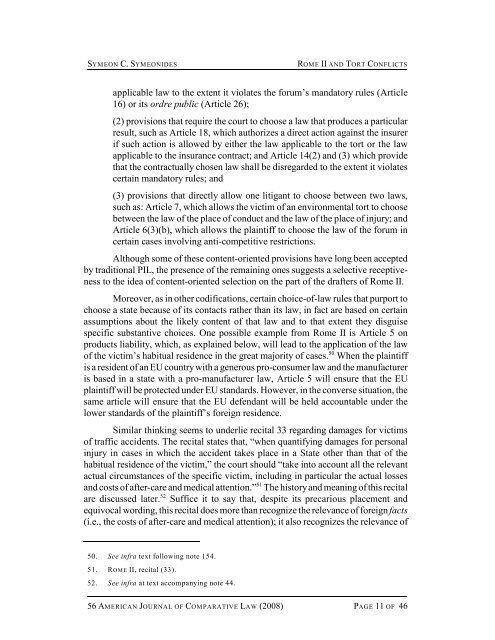
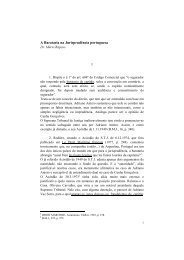
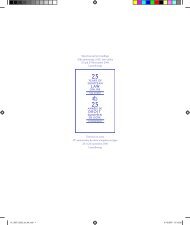
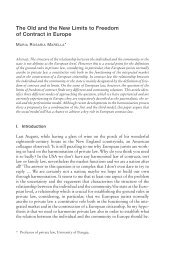

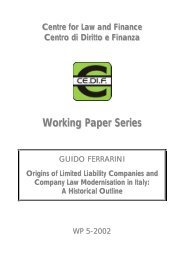
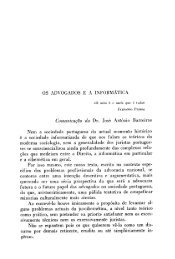
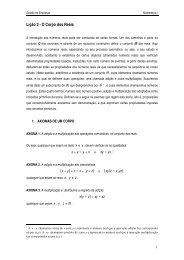
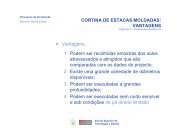
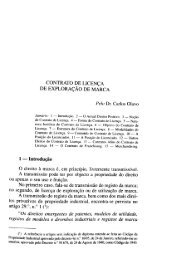
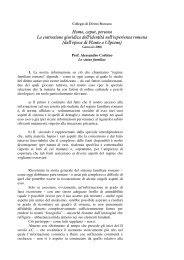
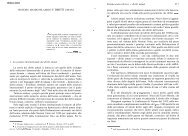

![Luigi Sapio Nozione di islām La parola “islām” [ ] è il mas.dar1 ...](https://img.yumpu.com/15836073/1/185x260/luigi-sapio-nozione-di-islam-la-parola-islam-e-il-masdar1-.jpg?quality=85)
